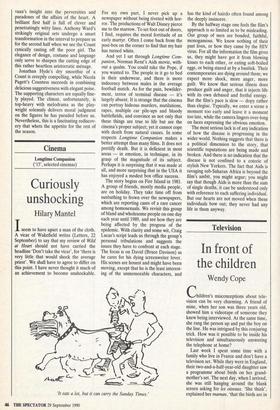Cinema
Longtime Companion ('15', selected cinemas)
Curiously unshocking
Hilary Mantel
Iseem to have upset a man of the cloth. A vicar of Wakefield writes (Letters, 22 September) to say that my review of Wild at Heart should not have carried the headline 'Don't take the vicar', for 'there is very little that would shock the average priest'. We shall have to agree to differ on this point. I have never thought it much of an achievement to become unshockable.
For my own part, I never pick up a newspaper without being riveted with hor- ror. The productions of Walt Disney pierce me to the marrow. To set foot out of doors, I find, requires the moral fortitude of an early martyr. Often I come back from the post-box on the corner to find that my hair has turned white.
And yet I sat through Longtime Com- panion, Norman Rene's Aids movie, with- out a qualm. You could take the Pope, if you wanted to. The people in it go to bed in their underwear, and there is more indecency between males in the average football match. As for the pain, bewilder- ment, terror of terminal disease — it's largely absent. It is strange that the cinema can portray hideous murders, mutilations, rapes, multiple car pile-ups and bloody battlefields, and convince us not only that these things are true to life but are the cinema's proper subject; yet it cannot cope with death from natural causes. In some respects Longtime Companion makes a better attempt than many films. It does not prettify death. But it is deficient in most areas — in emotion, in technique, in its grasp of the magnitude of its subject. Perhaps it is surprising that it was made at all, and more surprising that in the USA it has enjoyed a modest box office success.
The story begins on Fire Island in 1981. A group of friends, mostly media people, are on holiday. They take time off from sunbathing to frown over the newspapers, which are reporting cases of a rare cancer among homosexuals. We revisit this group of bland and wholesome people on one day each year until 1989, and see how they are being affected by the progress of the epidemic. With clarity and some wit, Craig Lucas's script leads us through the group's personal tribulations and suggests the issues they have to confront at each stage. The focus is on David (Bruce Davison) as he cares for his dying screenwriter lover. His scenes are honest and might have been moving, except that he is the least interest- ing of the unmemorable characters, and 'It eats a lot, but it can carry the Sunday Times.' has the kind of hairdo often found among the deeply insincere.
By the halfway stage one feels the film's approach is so limited as to be misleading. Our group of men are bonded, faithful, monogamous. We know nothing of their past lives, or how they came by the HIV virus. For all the information the film gives us, they might have got it from blowing kisses to each other, or eating soft-boiled eggs, or being stared at by a basilisk. Their contemporaries are dying around them; we expect more shock, more anger, more guilt. We know that serious illness does produce guilt and anger, that it injects life with its own debased and fretful energy. But the film's pace is slow — dopy rather than elegiac. Typically, we enter a scene a moment too early and leave it a moment too late, while the camera lingers over-long on faces expressing the obvious emotion.
The most serious lack is of any indication of how the disease is progressing in the wider world. Nothing suggests that there is a political dimension to the story, that scientific reputations are being made and broken. And there is no indication that the disease is not confined to a coterie of stylish New Yorkers. The fact that Aids is ravaging sub-Saharan Africa is beyond the film's ambit, you might argue; you might say that though Aids is more than the sum of single deaths, it can be understood only with reference to each suffering individual. But our hearts are not moved when these individuals bow out; they never had any life in them anyway.


























































 Previous page
Previous page